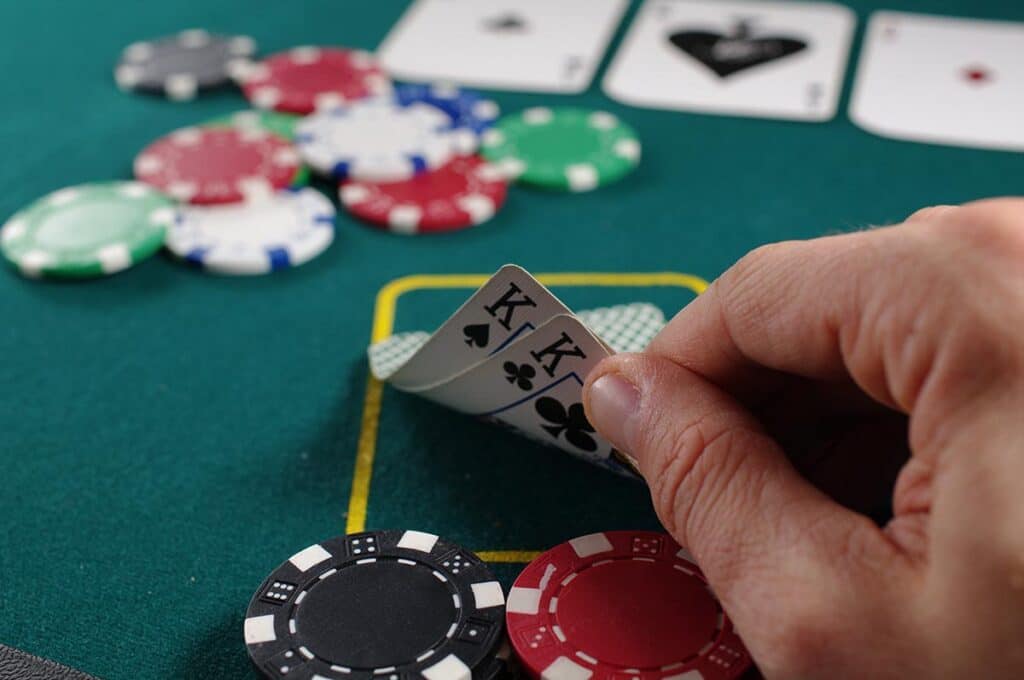The rules of poker remain the same offline and online. However, these two game formats are very different – read this article to find out which suits you best!
When you want to play poker, you can do it either offline or online. In the former case, you need a deck of cards and a company of other players. In the latter case, it’s necessary to have a computer or smartphone with an Internet connection. But it’s not the only difference between online vs live poker. Read this article to get to know more!
Live Games Tend to Be More Beginner-Friendly
If we carry out the online vs live poker stakes comparison, you’ll see that online games often require higher stakes. Internet casinos and poker rooms need to remain profitable. They can’t afford to spend time and effort on games with low stakes.
As a consequence, online poker attracts more experienced players. They aren’t afraid to risk larger sums because they know they will win more later. For novice gamblers, high stakes create excessive stress and might drain people’s budgets prematurely.
Please mind that it’s not a universal rule. If you only yesterday learned how to play poker, you can nevertheless find many opportunities to train online. Yet the more progress you make, the more chances you’ll have to enjoy the game online.

Online Poker Is Much Faster
It’s a crucial live poker vs online poker difference. The live variation of the game is perfect for entry-level players. First, you can join only one table at a time. Second, you can take time to thoroughly think over all your steps. You should expect to see no more than 40 hands per hour. The dealer will need time to handle the cards and money. Players might want to talk to each other during the session — especially if it’s not a tournament but a group of friends is just having fun on a weekend.
Online, you can play at several tables simultaneously. 100 hands per hour can be the norm. Cards will be dealt and prizes paid out in a matter of seconds.
You Can’t Read Other People’s Faces and Body Language Online
When comparing live poker vs online poker strategy, we need to mention one crucial factor. Online games usually don’t allow you to see the faces of your opponents. Meanwhile, facial expressions and body language can give you many valuable hints. The better you read the emotions of your opponents offline, the higher your odds of winning.

Offline, You Can Investigate Each Player’s Behaviour Strategy
This aspect of the live vs online poker strategy is relevant only for people who keep competing against the same person for a relatively long time. You see how eager this individual is to take risks and how much time they need to think before placing a bet. You get to know whether they prefer large or small bets. Of course, people might change their tactics depending on their mood and circumstances. Yet the better you understand your opponent, the easier it should be for you to predict their overall behavior.
Higher Win Rate in Live Games Doesn’t Necessarily Guarantee Larger Overall Winnings
When playing live, you’re subject to less stress. The longer you think, the smarter decisions you make and the more frequently you earn. However, we’ve already mentioned that stakes tend to be lower offline than online. Moreover, you’ll be playing slower than online. As a result, you might have a high winning rate — and modest overall winnings.
Experienced players make decisions faster when playing online. They complete more gaming sessions per fixed time period. In the end, they make more money with a comparable or even a slightly lower winning rate.
Some people treat poker as a source of income, even though a not-too-stable one. For them, money is the key factor that matters. For others, poker is first and foremost a way of socializing and having fun. There is nothing wrong with belonging to the second category, by the way!

Live Players Increase Their Bets More Freely
When you join an online poker table, all players will stick to more or less the same range of bets. When people feel confident, they will be likely to double or even triple their bets. But you’ll hardly ever see someone increasing their bets by x5, let alone x10…
In live poker, x10 won’t surprise anyone. Offline, people are more focused on their hands than on their bets. With a strong hand, a live player will be more likely to take risks.
Rakes Are Higher Offline
A rake is a fee that players pay to the organizer of the gaming session. When you sign up for an online casino, you don’t need to transfer any money to the platform for the simple fact of joining a poker table. However, you might need to transfer the rake to some online poker rooms and pay entry fees when taking part in tournaments. Top tournaments for pro players might have high fees. Yet in general, the rakes in online poker are affordable because the organizer doesn’t need to provide too many resources to you.
When playing offline, you have to book a room, invite people, meet them and make sure everything goes fine throughout the gaming session. To boost their profits, online casinos can promptly open additional poker tables. Their brick-and-mortar counterparts lack such an opportunity — so they try to make as much money as possible on the existing tables.
Before joining a game either offline or online, find out about its rake. Is it a fixed sum or a share of the pot? When you play with high stakes and win rather large amounts of cash, you probably won’t mind sharing a part of your profits with the organizers. But if the stakes and winnings are rather low, you might end up sharing more than you’d like to…
When the rake is uncapped, the organizers will be taking a fixed part from every pot, regardless of its size. If you play for the sake of money and not emotions, it would be smarter to avoid the uncapped rake. The only exception is games where you’ll be competing against very weak opponents and will have good odds to keep continuously winning.
Selected poker rooms arrange leaderboards and run promotions that enable top-performing players to decrease their rake expenses. Yet this practice is not too common.

Online Poker Offers More Flexibility
If you prefer real-life gatherings, you’ll need to agree in advance upon the date and place of your gaming session with other people. On the Internet, games and tournaments can also take place according to a fixed schedule. However, poker tables in online casinos operate 24/7, so you can join them without any preliminary arrangements.
Experienced offline players know how much you might need to sacrifice to enjoy a good game. The best sessions take place on Fridays and Saturdays. They start in the afternoon and go on until late at night. The rooms for them can be booked months in advance. If you join the game, you’d better cancel all your other plans for the next day. On the one hand, it’s not too convenient. On the other hand, it’s your chance to experience incredibly vivid emotions and, if fortune favors you, win a nice cash prize.
Final Thoughts
Hopefully, this article was informative and now you have a better notion of the difference between playing poker live vs online! Live games tend to be more beginner-friendly and slower than their online counterparts. Offline, you can read other people’s faces and body language as well as investigate each player’s behavior strategy. Live players increase their bets more freely — but a higher win rate in live games doesn’t necessarily guarantee larger overall winnings. Online poker offers more flexibility and its rakes tend to be low. Both options have their pros and cons. Hone your poker skills and try them both to understand which suits you best!








